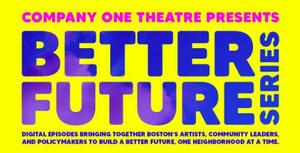Interview: Jasmine Brooks And Summer L. Williams of BETTER FUTURE SERIES at Company One Theatre

Summer L. Williams, associate artistic director and co-founder of Company One Theatre is, among other goals, using this time as a chance to reset. She ponders, "How do I take advantage of this chance to reimagine the way I think or work? I am finding things that I thought were internal pressures that are actually external pressures." Artistic associate and National New Play Network Producer in Residence, Jasmine Brooks lends her infectious exuberance as foil to Williams' placid warmth, agreeing with her response to a world in turmoil. "I have a responsibility as an artist and as a producer to make change and to generate conversations. Right now, I feel like I have a village around me of BIPOC artists in Boston (with whom) I am able to forge deeper relationships."
When the pandemic first shuttered the physical spaces in which Boston's theatre is usually made, Company One made every effort to continue supporting their community. Their first priority was to financially and emotionally take care of their staff, contracted artists, and their partners (they have yet to lay anyone off and have compensated artists with 50% of their contractual compensation). Then, Brooks explains, they wanted to look outwardly at how they could help take care of the Boston community as a whole. Their response is a series of monthly, virtual conversations centered around urgent, systemic issues facing Boston's residents, the Better Future Series. "We wanted to have artists involved in the conversation about moving forward, to really talk about art interacting with social change."
As the creative producer for the series, Brooks says her work began with "brainstorming artists and organizations that represent the richness in our city (to help us) reinvest in local issues." The first episode (available here) dove into the specific challenges 2020 has created for Chinatown. At the time Company One was planning the series, Chinatown's problems struck as particularly urgent, as businesses and residents faced unfounded aggression, fear, or disdain from outsiders over misplaced blame for the spread of a virus. However, the resurgence of the Black Lives Matter movement has since shifted the national ethos and given the group even more to talk about. Along with discussing the ways Chinatown was moving forward in lockdown, they discussed the importance of Asian solidarity with the Black Lives Matter movement.
"What's great is Black Lives Matter is engrained in our company and in what we have always produced. Yes, we want to be responsive, but these issues are core to everything we do," analyzes Williams when asked if the ongoing protests and demonstrations in the world had affected the development of this series. "We are essentially doing the work we would do on any production. We're providing dramaturgical content, information on local organizations- trying to course-correct societal ills." Company One is known for providing resources for audiences to further engage with the societal problems addressed in their plays, but this time, Williams notes, "the world is the play."
Brooks echoes that this series will further dig into partnerships and perspectives that Company One has already been engaging with, while also exploring relationships with new groups and people. Her current focus in planning more panels is on the neighborhoods and individuals who could benefit the most from an uplifted platform right now.
Who should be tuning into this series? "Unfortunately everyone," shrugs Williams, responding to the city's essentially universal need to participate in these conversations with more rigor. "Right now, American selfishness is sitting right at the surface. Boston is a small-big city- something about it is neighborhood-y, quaint, and beautiful. But (the city) works hard to keep the lines of segregation in place."
This Friday, episode 2 of the Better Future Series will explore summertime in Upham's Corner. According to Williams, when Company One staged Leftovers by Josh Wilder at the under-utilized Strand Theatre in Upham's Corner, there was a customary response from C1 patrons that they had never been to this area of Boston before. "People can say 'I grew up here' but have never been to this specific place and there's work to be done around what that is steeped in." Hopefully, Williams continues, people will tune in to the Better Future Series' next installment and choose to "opt in to help alleviate social pressures." As she reasons, "change doesn't happen overnight, but initiating engagement can. Societal change takes consistent, incremental acts."
Brooks and Williams agree that their work on this series will continue to inform the way they work even when theaters "come back". Williams surmises, "Theatre can take the lead right now and help people imagine that the 'new normal' will be okay." After tuning in last month, I look forward to hearing from the panel this Friday.
More information here.
Comments

Videos

